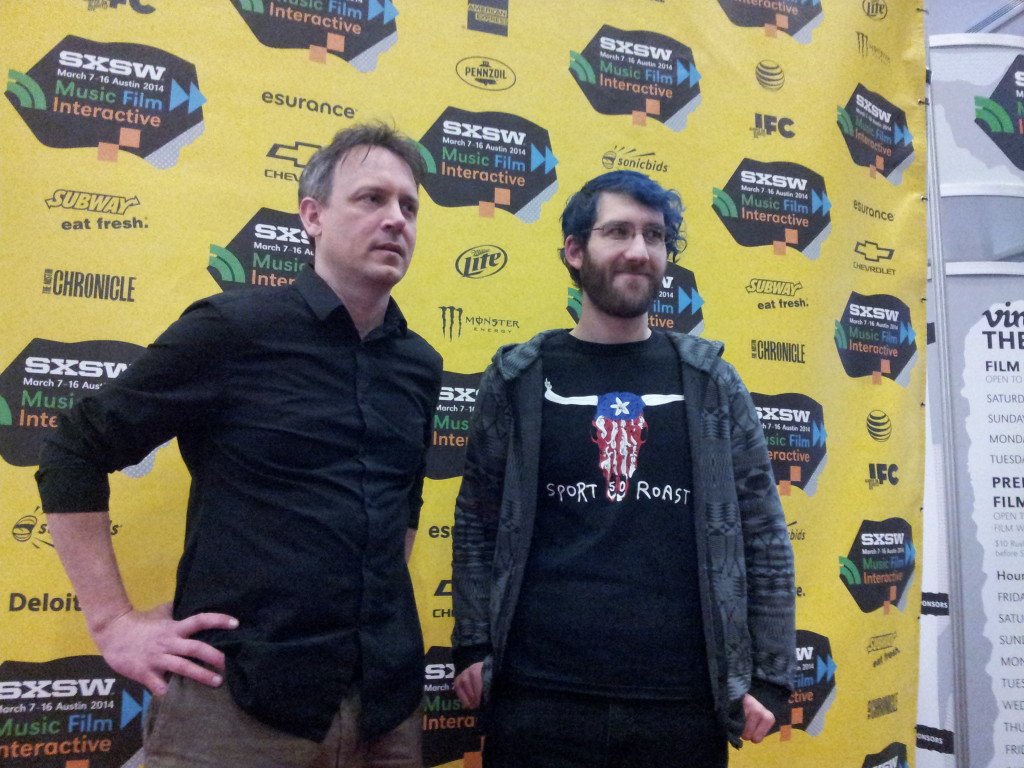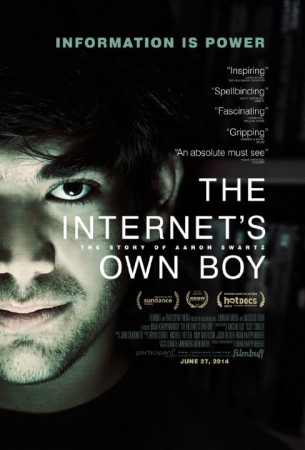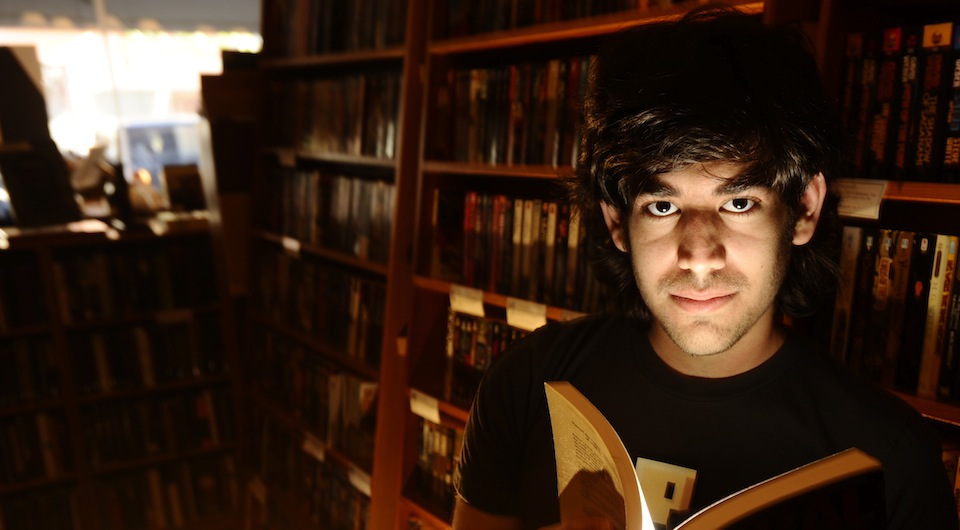Originally published at Firedoglake.
At the beginning of 2013, the Internet lost one of its most radical, most pioneering minds when Aaron Swartz took his own life. In just 26 years, Swartz pioneered technologies like RSS syndication and the Creative Commons (both of which are in daily use here at Firedoglake), was a founder at Reddit, and led a successful fight against the destructive proposed Internet legislation SOPA. The Internet’s Own Boy, the new documentary from Brian Knappenberger (We Are Legion), is the story of his life and death.
Though dying by his own hand, in the incredible outpouring of grief that followed online and off, almost all blamed the government. They had good reason to do so. Swartz faced decades in prison under the controversial Computer Fraud and Abuse Act. Government prosecutors had literally told Swartz that they intended to “make an example of him” by forcing him to face maximum penalties if he fought in court. Believing himself innocent, he repeatedly refused deals that would have seen him pleading guilty to a felony and spending months in jail and longer without a computer.
Swartz’s “crime?” Downloading too many documents from JSTOR, a database of scientific and academic papers. Though most are paid for by tax dollars, JSTOR and other similar companies charge outlandish fees for access. Using a computer script and a laptop plugged directly into MIT’s network, Swartz had downloaded thousands of these documents. The Internet’s Own Boy sheds important new light on Swartz’s controversial activities and on the outlandish lengths the government went to prosecute him for them. No one knows what Swartz intended to do with the files, but the film reveals that he’d previously accessed other databases in order to do large scale statistical analysis. One likely theory is that Swartz planned to analyze the data to find links between polluters and the favorable academic research they sponsor.

Of course, many people know the basics of this story and a dry recitation of facts by talking heads would make for a terrible documentary — even when those talking heads are people like Sir Tim Berners-Lee, and interviewed by someone as skillful as Knappenberger. But Aaron Swartz’s life was an incredibly well-documented life. The Internet’s Own Boy is rich with footage tracing his life from exceedingly precocious toddlerhood through the public speeches he began giving as a teen. The women he loved share not just their stories, but footage of their lives and the families they built. I found tears in my eyes repeatedly during the SXSW screening I attended in tech-friendly Austin, Texas, and could hear many around me sniffling as well.
The Internet’s Own Boy is a portrait of a complicated, flawed genius, and a warm and caring human who used his immense skills for the greater good when most would have simply been content to make money. It will be released in theaters later this year, and the studio plans to make it available under the Noncommercial Share Alike form of the Creative Commons license.
Talking With Brian Knappenberger
Kit O’Connell, Firedoglake: I’m not going to ask why Aaron Swartz — it’s obvious because so many people were touched by him — but what drew you to this project?
Brian Knappenberger: Technically where it started was I was on a panel talking about hacktivism in New York about a week after he died. It was a Microsoft social computing symposium they invited us to talk at. And everyone knew Aaron, I was even on a panel with Quinn Norton and Biella Coleman and it was this really intense, somber affair. So I started filming right there. At first I thought it was going to be a short film which seems odd to think now, but I talked to his dad and that was just really moving.
I also randomly — on a personal level — I had a friend commit suicide just four months before Aaron died. And I was still reeling when Aaron died, on a personal level still figuring that out. I couldn’t — I still don’t get why my friend Brian Gerber who also produced environmental documentaries — I didn’t understand, still don’t understand why Brian committed suicide. There’s a personal level where the story resonated with me.
FDL: As you crafted this film you crowdfunded a lot of it.
BK: Some of it, about a half or a third.

FDL: Now you’re working with some kind of Creative Commons license to release the film. Tell me a little more about that.
BK: There were a lot of offers at Sundance, I mean big offers. But it was important to me with Aaron being an architect of Creative Commons that it have some kind of Creative Commons release. You can imagine these nightmare scenarios where somebody wants to help distribute yet tries to crack down on piracy, or wants to distribute it with DRM restrictions.
FDL: So many studios would do that without even thinking about it.
BK: Without even thinking about it. But play that out — where somebody like Aaron would be trying to watch the film and be exposed to criminal prosecution. It’s an absurd situation. It was always part of the fabric of the film but it also jives with my own feelings that sharing shouldn’t be criminalized so we had to find the right partner. We went with Participant and they’re fired up about that kind of social action campaign.
FDL: It seems like in making this film you got a lot of access, everyone was pretty open with you.
BK: Yeah, definitely.
FDL: Was there anybody you couldn’t reach but wish you could?
BK: The government. I tried the whole time. I kept trying and trying. And I was respectful. I wanted to know what they were thinking.
FDL: What would you have asked?
BK: What was the case? Why was it so important. They said it was a case for deterrence but deterring what? What were they deterring? Were they deterring hacking? This is an odd case for hacking. He broke in to look at academic journal articles, which he did previously at Westlaw and never released them. He just looked at them for evidence of corruption in legal research — and found it. He could have been doing the same thing here, we don’t know. And why go after him? Why make this case?
FDL: Do you have any theories? What do you think it was?
BK: Well, I think there’s a lot of pressure on prosecutors. When the word comes down to get tough, there’s pressure on prosecutors to notch a conviction. This prosecutor went too far, for sure. I think it’s a case of an overzealous single prosecutor but I also think it’s a case of a bigger problem with our criminal justice system. Look at the landscape of our criminal justice system — 97% of the people in our criminal justice system plea out. It’s crazy to think that 97% of the people in our criminal justice system are guilty. That just can’t be the case.
Obviously people are afraid to go to prison, they don’t know their rights, or its just too expensive to fight.
FDL: They say we’re going to stick you with everything we possibly can.
BK: So prosecutors ramp up these charges, they scare the shit out of people with these 35, 50 year sentences — Barrett Brown was facing 105, but that just got reduced with all those charges being dropped so now he’s looking at 70. They’ll never get 70, they’re threatening him with 70. People say ‘oh they’re never going to get it’ but that’s part of it.
FDL: That’s the game. It’s like charging the NATO 3 with terrorism so they can get them on arson.
BK: Yeah, exactly. They know juries will often try to split the difference. All they really need is one conviction out of 13 or 17 charges. They don’t want these cases to go trial, they want them to plea out.
Even bigger picture, our relationship with information and secrecy in this country is a problem. Think of things that Aaron was trying to do: he wasn’t stealing credit cards, he wasn’t stealing money, even pirating movies.

FDL: Something about Aaron touched so many people. My mother (Firedoglake’s Siun) even met him and called me up when she heard. What do you think about Aaron was so special to so many people?
BK: That’s one of the things that made me want to make the film. That week after there was this tsunami of people. I went to the Cooper Union where they held a memorial in New York. They thought they were going to get maybe 100 people, but they packed that place. It was like 800, standing room only. These were people who hadn’t met him, but his story resonated with them. So why?
I think that most people recognized in him a turning away from a kind of build-to-flip startup culture and a dedication to using his skills and energy and time towards genuinely making the world a better place. That’s a startup slogan right? So many companies at SXSW Interactive here say “we’re going to make the world a better place.” But what does that mean? They want to improve their own bank account with startup funds. You can’t say that about him. He sold Reddit, and then he genuinely dedicated the rest of his life to using his skills in interesting, innovative ways to change the world and I think people respect that. That resonates with people who feel frustrated with the system.
FDL: Right after he died there was talk of legal reform. If you look online now, there’s still this low-level geek buzz around Aaron, it’s never gone away.
BK: Yeah.
FDL: But some of the legal talk, the bigger talk has faded. Do you hope your film helps with that?
BK: Yeah, I do.
FDL: What can we do as people watching his film, people who care about his legacy?
BK: Unfortunately it does seem like Aaron’s Law has stalled. Part of the effort of the film, I hope, I hope we can, certainly what we’re going to try to do is either reinvigorate some version of Aaron’s Law. Aaron’s Law is not perfect in some ways, it’s not everything you want changed with the Computer Fraud and Abuse Act but it’s certainly a good start. There was a big discussion of reforms when he first died and I hope this film can get it moving again.
FDL: Any last thoughts?
BK: One of the reasons I think Aaron’s story resonates is he believed you should participate and make a difference in things. You can stand up, you can make your voice heard. It’s easy to get intimidated by the Internet.
We all live on the Internet now, right? This isn’t some distant realm of geeks and hackers. We all live there, every important part of our lives has an online component. You can participate in that. The Internet is a machine made of code and laws and you get to have a say.